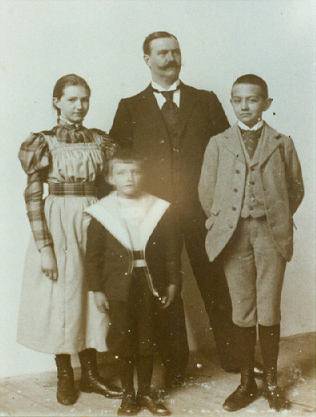E. Röver
| Founded/Born - Closed/Death | 1857 - 1923 |
|---|---|
| Still active? | no |
Ernst Röver, born Friedrich Wilhelm Ernst Röver on September 3, 1857, in Meierhof near Stade, was a prominent German organ builder of the late Romantic period. He came from a notable family of organ builders; his father, Johann Hinrich Röver, and his brother, Carl Johann Heinrich Röver, were also involved in the trade. Ernst and his brother joined their father's business in 1877, which was then known as "Johann Hinrich Röver & Söhne OHG." Ernst later moved to Hausneindorf in 1884, where he took over Emil Reubke's company, leading it to significant growth and innovation. The company expanded with new facilities and advanced production techniques, employing up to 25 workers by the onset of World War I.
Röver's work was characterized by his interest in technical innovations, particularly in the development of windchests and action mechanisms. He introduced several advancements, including a novel transmission device, a register keyboard, a pneumatic combination action, and a box windchest based on tubular pneumatic action. His efforts in improving the pneumatic action reduced tonal delays and increased reliability. Over his career, Röver completed more than 200 new organs, with a significant number of these located in the Hamburg area. His largest project, a three-manual organ with 101 registers for St. Nicholas' Church in Hamburg, was destroyed during World War II. Despite his success, the company ceased organ production by 1919 and shifted to manufacturing for the defense industry. After Röver's death in 1923, the company eventually dissolved, and much of its legacy was lost with time.
Röver's work was characterized by his interest in technical innovations, particularly in the development of windchests and action mechanisms. He introduced several advancements, including a novel transmission device, a register keyboard, a pneumatic combination action, and a box windchest based on tubular pneumatic action. His efforts in improving the pneumatic action reduced tonal delays and increased reliability. Over his career, Röver completed more than 200 new organs, with a significant number of these located in the Hamburg area. His largest project, a three-manual organ with 101 registers for St. Nicholas' Church in Hamburg, was destroyed during World War II. Despite his success, the company ceased organ production by 1919 and shifted to manufacturing for the defense industry. After Röver's death in 1923, the company eventually dissolved, and much of its legacy was lost with time.
No YouTube videos available.
Make this Notebook Trusted to load map: File -> Trust Notebook
https://de.wikipedia.org/wiki/Ernst_R%C3%B6ver
 Pipe Organ Map
Pipe Organ Map